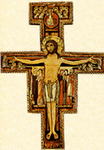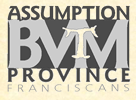

So, who are YOU voting for? Barak Obama or John McCain? Those are rather brazen questions, and quite frankly, it's none of my business!
However, whom WE vote for is all of our business, at least it will be in the end when National Election 2008 is over by late Tuesday, 4 November.

Not so long ago there used to talk of a "Catholic vote". This meant that at least a majority of US citizens who identified themselves as Catholics tended to vote in a particular way, usually Democratic.
This was not universal, but it was strong enough to gain a popular title, at least through the media. Many Democratic candidates, at least in the North, tended to foster policies which the Catholic Church supported -- outreach for the poor, support for laborers, justice for the marginalized and disenfranchized and the like. As the '60s progressed into the '70s, the Catholic Church also supported affordable housing, Civil Rights, an end to the war in Vietnam and initiatives which supported and encouraged the poor, including education and job opportunities without discrimination based on race, ethnic identity, gender and religious affiliation.
Catholics themselves had been the subjects of discrimination, especially with the arrival of the multitudes of Irish people in the mid-1800s. Subsequent European Catholic immigrants also faced a harsh "welcome", in the mines and in the mills, in the Northeast, Midatlantic and Midwest USA.

President John F. Kennedy inauguration in 1961. President Kennedy, a desendant of Irish immigrants,
was the first (and only) Catholic elected to the US presidency.
Pope Leo XIII published his socially conscious encyclical,
Rerum Novarum in the 1890s to address the social ills of the late 19th century, and especially the growing specter of Marxism in Europe and beyond. Thus began the modern Catholic social teaching which would be added to by Pope Pius XI (
Quadregessimum Annum), Pope Bd. John XXIII (
Pacem In Terris) and Pope John Paul II (
Laborens Exercens). That, and the document of the Church in the modern world at the Second Vatican Council (
Gaudium et Spes) solidified the Catholic Church's engagement in modern society.
US Catholics, though, found themselves in a quandary and struggled with American identity vis-a-vis the US Supreme Court's decision on 22 January 1973 in the case of Roe v. Wade which paved the way for abortion on demand as a woman's right to privacy and her freedom of choice. As we all know, this continues to be a major significant area of concern, both for Right to Life groups and those which favor a woman's individual right to choose to have an abortion.

The US bishops, in their document
Faithful Citizenship encourage Catholics to exercise their right to vote calling such involvement a moral obligation (please see picture above). They also state that each is to vote according to one's conscience.
They can be easily accessed on-line at
www.usccb.org/faithfulcitizenship/FCstatement.pdf for the download to this insightful document. The US bishops state that one should not vote for one issue only. At the same time the issue of life, especially for the most vulnerable persons, along with respecting human dignity of all persons from conception to natural death, are crucial. The US bishops call for attention to the issues regarding life -- abortion, euthanasia, embyonic stem cell research (and destruction of human embryoes in the process). They also point to the care for the elderly, infirm and disabled persons, responding to the needs of the poor, rights of workers, the plight of many immigrants, whether they be in this land legally or are undocumented, and the issues of peacemaking and bringing wars to an end.
 A very fine video presentation that seems to attempt to address this (with rather dramatic music, by the way) is www.CatholicVote.com. It is definitely a Catholic perspsective.
A very fine video presentation that seems to attempt to address this (with rather dramatic music, by the way) is www.CatholicVote.com. It is definitely a Catholic perspsective.
The US bishops do not tell us, the Catholic electorate, HOW to vote. Rather, they do give us some rather well thought out guidelines for discerning and making responsible decisions according to one's informed conscience. Conscience, however, is NOT opinion!
Is there a "Catholic" vote? Probably not any longer. At least, not like it may have been once in the past. Nevertheless, there are Catholics -- MANY Catholics -- who vote!
 From wherever you are reading this, we in southeastern Wisconsin are having a very white Christmas. It could change, of course! The snow is sloppy wet and the temps seem to be going up. But, then again, we're expecting another 3 inches or so today. Glory to God!
From wherever you are reading this, we in southeastern Wisconsin are having a very white Christmas. It could change, of course! The snow is sloppy wet and the temps seem to be going up. But, then again, we're expecting another 3 inches or so today. Glory to God!



 Some musings of a Franciscan friar in a Midwestern winter:
Some musings of a Franciscan friar in a Midwestern winter: Maybe that's just how our lives are -- adjusting to the fluctuations that happen beyond our control. Economic downturn, violence both near and far, insecurity at work, a loved one's illness. I don't think it means we're "powerless", at least not completely so.
Maybe that's just how our lives are -- adjusting to the fluctuations that happen beyond our control. Economic downturn, violence both near and far, insecurity at work, a loved one's illness. I don't think it means we're "powerless", at least not completely so.




 His Beatitude has been accused of collaborating with the KGB when the USSR was still extant. Some noted that the once secret files of the former secret police force (for which Vladimir Putin worked) have supported this allegation, although there was no arrived conclusion.
His Beatitude has been accused of collaborating with the KGB when the USSR was still extant. Some noted that the once secret files of the former secret police force (for which Vladimir Putin worked) have supported this allegation, although there was no arrived conclusion.
























 Not so long ago there used to talk of a "Catholic vote". This meant that at least a majority of US citizens who identified themselves as Catholics tended to vote in a particular way, usually Democratic.
Not so long ago there used to talk of a "Catholic vote". This meant that at least a majority of US citizens who identified themselves as Catholics tended to vote in a particular way, usually Democratic.

 A very fine video presentation that seems to attempt to address this (with rather dramatic music, by the way) is
A very fine video presentation that seems to attempt to address this (with rather dramatic music, by the way) is 








